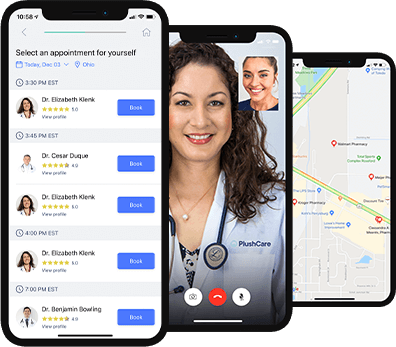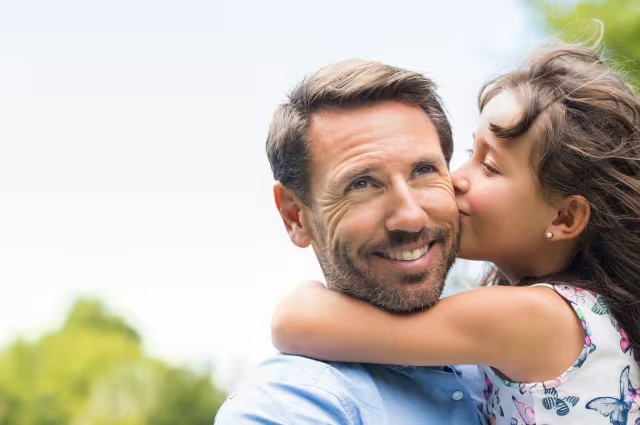How Long Is a Cold Sore Contagious?
Cold sores are typically contagious for a two-week period. The most contagious times for a cold sore are when the blisters begin to show up and after they burst, releasing their clear fluid. Once a cold sore bursts, dries, scabs, and completely heals, it is no longer contagious.
By the time you start to feel the tingling of the cold sore underneath your skin, the very contagious HSV-1 virus has already started to flare up and it will be possible for you to spread the virus to others.

1
Book on our free mobile app or website.
Our doctors operate in all 50 states and same day appointments are available every 15 minutes.
2
See a doctor, get treatment and a prescription at your local pharmacy.
3
Use your health insurance just like you normally would to see your doctor.
What Is A Cold Sore?
Cold sores are tiny, painful, fluid-filled blisters caused by a common viral infection called herpes simplex virus (HSV-1). “In 2016, an estimated 3.7 billion people under the age of 50, or 67% of the [global] population, had HSV-1 infection (oral or genital),” according to the World Health Organization.
The virus causes tiny blisters filled with fluid that often appear in clusters on or around your lips. They can also appear as a single sore filled with clear fluid. When the blister breaks open, a crust forms and then starts to scab.
Read: Canker Sore vs Cold Sore: How to Tell the Difference
Are Cold Sores Contagious?
Yes, cold sores are highly contagious. Cold sores are contagious from the moment you feel tingling or notice other cold sore symptoms, which often starts before the formation of a blister.
How Do You Know When a Cold Sore Is No Longer Contagious?
When your skin has healed from the cold sore and looks normal, the virus is no longer contagious. However, because the herpes virus stays dormant in your body, you can still pass on the virus through your saliva, even if you don’t have a cold sore.
Once you catch the HSV-1 virus, you will have it for life. For some people, the virus lies dormant and they never have symptoms. Others get breakouts of cold sores.
How Easy Is It To Get A Cold Sore From Someone?
Cold sores are highly contagious. Cold sores can be spread through skin-to-skin contact like kissing, oral sex, or sharing objects such as towels, eating utensils and straws. The virus is contracted through any break in your skin that may not even be noticeable to you.
It’s common to think that a cold sore isn’t contagious anymore once it has scabbed, but this isn’t the case. You are still contagious until the cold sore completely heals.
It is possible to kiss someone with a cold sore and not get it. However, open cold sores are extremely effective at spreading the HSV-1 virus, and all physical contact should be avoided until the sores have burst, scabbed, and closed completely.
Read: How To Get Rid Of Cold Sores Fast
How Long Do Cold Sores Last?
Generally, the initial outbreak from a cold sore lasts 10–14 days. Over time, subsequent outbreaks usually lessen in severity and take less time to heal. Although the cold sore may disappear, the virus that causes cold sores will remain in your body.
Cold Sore Stages
There are five stages in the development of a cold sore, with the first stage starting approximately 24 hours between the blister appears. When cold sores appear, they typically follow the five cold sore stages:
Cold Sore Stages Day 1–2: Tingle Stage – Tingling and itching may occur for 24–48 hours. Treating a cold sore early in this stage can help reduce the time it takes to heal. “If you regularly get cold sores, use antiviral creams as soon as you recognize the early tingling feeling,” according to the National Health Service.
Cold Sore Stages Day 2–4: Blister Stage – A sore or cluster of tiny sores that look like blisters will appear and begin to fill with clear fluid. The skin may be red underneath and surrounding the blisters.
Cold Sore Stages Day 4–5: Ulcer Stage – At this stage, the blister will burst open and begin to ooze. The sores are often painful and itchy. The cold sore may look red and shallow.
Cold Sore Stages Day 6–9: Scabbing Stage – The blistery sores will begin to dry out and scab over. They may crack and itch. As the blister dries out, it will turn a brown or yellowish color.
Cold Sore Stages Day 10–12: Healing Stage – Finally, the scab will start to fall off or flake away and begin to heal. The scab usually does not leave a scar.

1
Book on our free mobile app or website.
Our doctors operate in all 50 states and same day appointments are available every 15 minutes.
2
See a doctor, get treatment and a prescription at your local pharmacy.
3
Use your health insurance just like you normally would to see your doctor.
Is There Medication for Cold Sores?
Yes, medication is available to help speed up the healing process. Although there is no cure for cold sores caused by the HSV-1 virus, you can help speed up the healing process by taking medication in the earliest stages of your symptoms, such as when you start to feel the tingling or see itchy red skin.
Prescription medications, such acyclovir, can be taken before a flare-up to prevent a full-blown cold sore.
Dealing with cold sores? Book an appointment with a PlushCare physician and get a prescription treatment sent to your pharmacy today!
Sources:
PlushCare is dedicated to providing you with accurate and trustworthy health information.
Mayo Clinic. Cold Sore. Accessed on December 1, 2020 at https://www.mayoclinic.org/diseases-conditions/cold-sore/symptoms-causes/syc-20371017.
Harvard Health. Preventing cold sores. Accessed on August 8, 2020 at https://www.health.harvard.edu/oral-health/preventing-cold-sores
National Health Service. Cold sores. Accessed on November 1, 2021 at https://www.nhs.uk/conditions/cold-sores/



